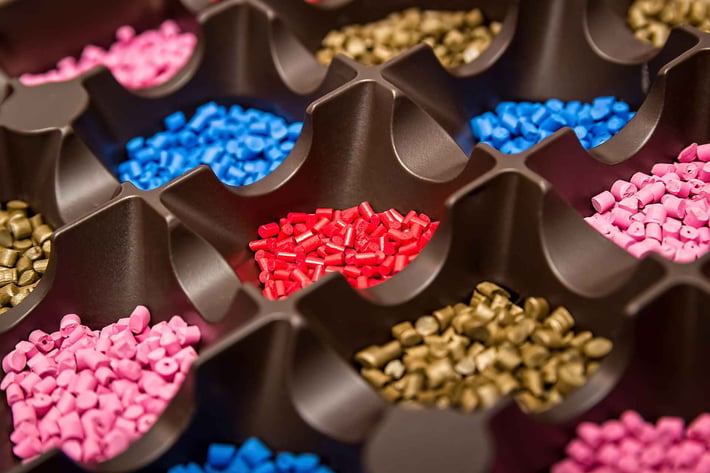
There are many different common types of plastics used in the injection molding industry today. And for many projects, there will be numerous suitable plastics to choose from.
Of course, choosing the best thermoplastic material for your project isn’t simply a case of going with the strongest and most durable option, or choosing the cheapest suitable material. You have to carefully consider the use cases for your end products, all of the performance requirements, potential reliability issues that may arise, as well as the overall material cost, availability, and sustainability.
Comparing the Advantages of Common Injection Molding Materials
ABS
ABS, or acrylonitrile butadiene styrene, is a versatile thermoplastic material suitable for many custom injection molded products. Lightweight, easily machinable and readily available, ABS is often the first choice for manufacturers. This unique material combines polybutadiene (which promotes rubberiness with high impact strength) with special nitrile groups to make it stronger than polystyrene.
In addition to its machinability, ABS is also relatively easy to glue, sand, paint, and finish with custom colors/textures. The material is naturally resistant to many common industrial chemicals as well as electrical current, while special ABS grades can be formulated (for example by adding fiberglass fillers) for even higher strength and flame resistance. ABS is commonly used in electronic device housings & covers, appliances, plumbing fittings, and toys to name just a few.
Polycarbonate (PC)
Polycarbonate (PC) is a subset of specialized thermoplastic materials which offer high strength combined with outstanding thermal stability. The material is naturally transparent, making it a suitable glass replacement while being much lighter than standard glass panels. Polycarbonate can also be custom colored, substantially broadening its product uses.
Polycarbonate plastics offer similar material characteristics to injection molded acrylics, but with higher strength and higher levels of heat resistance. In fact, polycarbonate is even more resistant to extreme temperatures than ABS plastic, though it lacks ABS material’s level of chemical resistance. Like acrylic polymer, PC plastics are easily workable and machinable, making it a versatile thermoplastic for many unique injection molding applications. Other more specialized grades of PC can include fiberglass for stiffness, ESD for electrostatic dissipation, or impact modifiers for cold temperature applications. Common uses of PC are when there is a need for the parts to take a strong impact with very little deformation.
ABS-Polycarbonate (ABS-PC)
ABS-PC, as you might imagine, is a blend or alloy of both ABS & PC. The strength and impact resistance of polycarbonate (PC) with the improved chemical resistance from ABS. ABS-PC is commonly used in enclosures where the device will be exposed to chemical cleaners, such as medical devices, or where there are flammability requirements combined with a need for impact resistance.
Nylon or Polyamide (PA)
As an injection molding material, Nylon offers high tensile strength and outstanding fatigue resistance. There are many common additives such as glass fibers that can further optimize its material properties, e.g. for higher impact strength or better chemical/heat resistance. Nylon can also be improved through specialized conditioning processes, which carefully reintroduce moisture into the material after molding for increased pliability. Owing to its semi-crystalline structure, Nylon is generally regarded as resistant to many common chemicals that attack other plastics. There are different types of nylon: Nylon 6, Nylon 6/6, Nylon 12, etc. just to identify a few of the many specialties, each with their own advantages. Nylon can be found in many automotive connectors and fittings.
In some applications, nylon can be used as a metal replacement plastic for low-strength alloys. However, the downsides are that the material offers relatively low strength and impact resistance compared to other injection molded plastics, combined with a relatively high shrink rate of roughly 0.014" - 0.023" per inch.
Acetal or Polyoxymethylene (POM)
Acetal, is the common name for polyoxymethylene (POM), a semi-crystalline thermoplastic material. It is extremely strong, highly resistant to wear and abrasion, while also offering outstanding dimensional stability and creep resistance. Finally, acetal is easily machinable while maintaining precision tolerances.
Polyoxymethylene plastics are highly durable and provide a low coefficient of friction, often making it the choice material for engineering projects with moving parts. For example, injection molded gears, bushings, valves, and chain links are commonly manufactured from acetal. To further enhance this characteristic, some grades include PTFE to enhance their natural lubricity.
Achieving an Optimized Material Solution for Your Custom Injection Molding Project
There are many, many types of plastics used in injection molding, each with trade-offs on performance, availability, and cost. The materials science experts at AIM Processing can help you choose the most optimized plastic material for your custom injection molding project. As one of the Denver, Colorado region’s leading plastic molding companies since 1993, offer all of our customers invaluable industry experience, as well as the superior quality and customer service to back it up.

 SINCE 1993 MADE IN USA
SINCE 1993 MADE IN USA 

